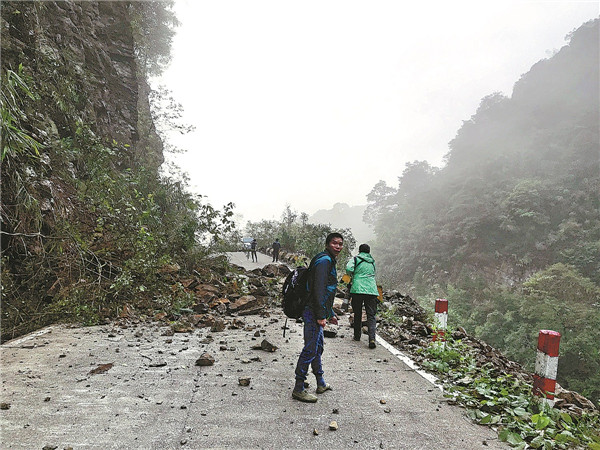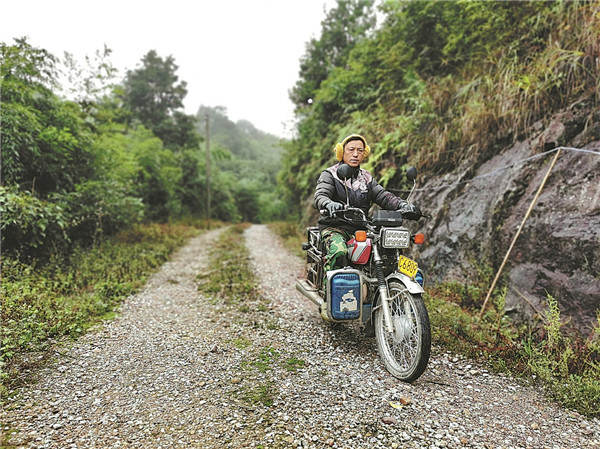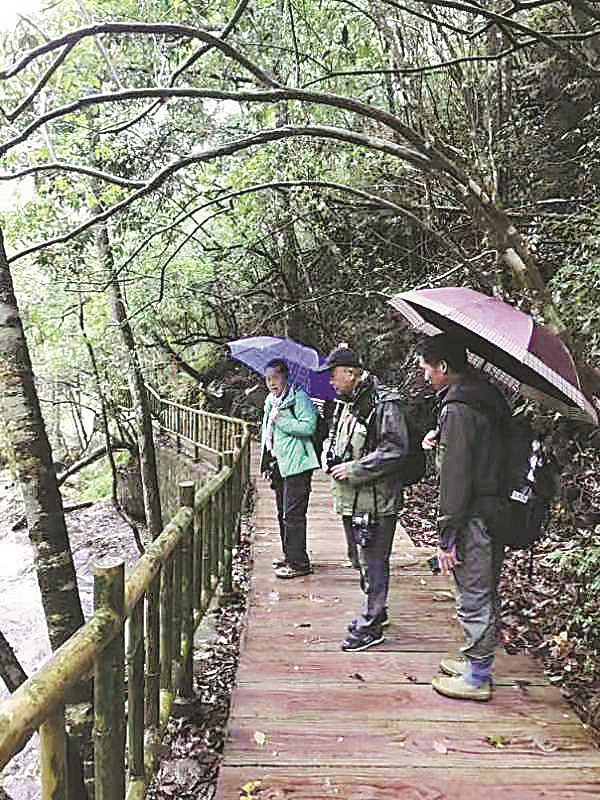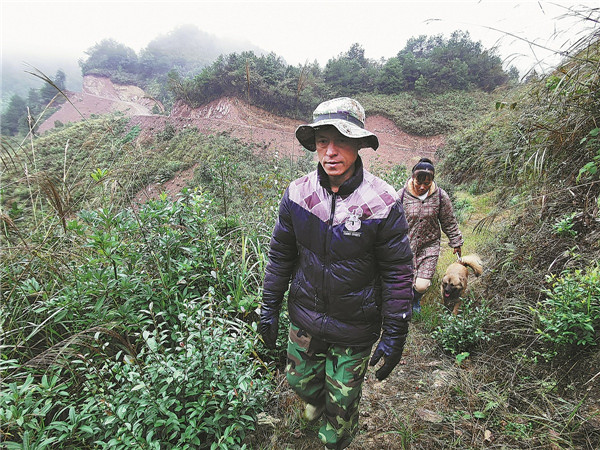Ranger's high life keeps nature safe

Su Guorong (front) guides bird-watchers past a section of road that has seen a rockslide on Shengtang Mountain during a recent "bird race" at the reserve. ZHENG WENFANG/FOR CHINA DAILY
A warden in an isolated part of South China recalls the challenges he has overcome during his nearly three-decade career. Chen Liang reports from Jinxiu county, Guangxi Zhuang autonomous region.
From Oct 21 to 23, Su Guorong, a forest ranger at the Dayao Mountains National Nature Reserve, took part in a three-day bird-watching festival. The event was held in Jinxiu county, Guangxi Zhuang autonomous region, where the reserve is situated.
The patrolman and 11 of his colleagues guided 12 teams of enthusiasts from 10 provinces and autonomous regions to compete in a "bird race", which was also part of Free Flying Wings, a grassroots avian conservation project.
As part of the race, Su led three bird-watchers to different sites within the county, which is nestled deep in the mountains, and worked hard to record as many species as possible.
The 55-year-old enjoyed the activity and considered it "one of the most pleasant jobs" he has undertaken during the 29 years he has worked for the reserve.
He said that for many years, his routine work as a ranger has been painstaking, challenging and sometimes even dangerous.

Forest ranger Huang Tongfu rides along a gravel road to the Longdao Mountain patrol spot at the Dayao Mountains National Nature Reserve in Jinxiu county, Guangxi Zhuang autonomous region. CHEN LIANG/CHINA DAILY
Basic amenities
When he started working at the reserve in August 1992, Su was assigned to the patrol station at Shengtang Mountain. At the time, the reserve, which was founded in 1982, was a county-level facility, short of funds and facilities.
The station consisted of almost nothing but open ground at an altitude of about 800 meters on the mountain, the highest peak in the Dayao range.
Su and his three colleagues had to build their own bamboo huts, which had no power supply or running water, and they slept on bamboo beds. Su had to walk more than 20 kilometers to the station from his home in the county seat, carrying a backpack that contained enough food to last a week.
"We had to cover our quilts with plastic sheets while we slept to prevent them from becoming soaked by rain or dew," he said.
The rangers were responsible for protecting 4,000 hectares of forest along several trails. It took two or three days to cover the entire area, he recalled.
In 1992, he was paid 75 yuan a month. That became 80 yuan in 1996 or 1997 when he became deputy station head, but the sum rose to 85 yuan when he was promoted to station head.
The reserve was officially upgraded to a national facility in 2000. Gradually, the bamboo huts were replaced by log cabins, and now the rangers are housed in a concrete building.
Meanwhile, the forest trails were upgraded to six patrol routes, and the rangers gradually gained access to electricity, tap water and computers. Now, they also have a cellphone signal, and Su can ride his motorcycle home along a sealed road.
Even though the infrastructure improved every year, the work remained challenging for a long time. "There were various types of difficulties," he said.

Su Guorong (right) guides avian enthusiasts during a bird-watching festival held in Jinxiu in October. ZHENG WENFANG/FOR CHINA DAILY
Poaching plague
Between 1995 and 2018, the rangers' major challenge was a poaching craze centered on Podocarpus macrophyllus, aka the Buddhist pine or the Chinese yew tree.
The pine, native to the mountainous areas of China and Japan, is an evergreen conifer that typically grows as a narrow, conical tree. Because of the beautiful shapes it can assume, the tree is often used to decorate gardens and create bonsai displays.
Small-leaved Buddhist pines, found in the mountainous areas of Guangxi and the provinces of Guangdong and Hainan, are difficult to cultivate in artificial environments.
However, they used to be common in certain areas and were not even mentioned on the national list of protected plants, said Tan Haiming, deputy director of administration at the reserve.
"Because of intensive poaching in the 1980s, they (the trees) disappeared from the wild in many areas. But there were still more than 10,000 Buddhist pines growing on Shengtang Mountain, and many of them were hundreds of years old and had grown into beautiful shapes. So, they became tantalizing targets for poachers," he said.
Initially, buyers often came from neighboring Guangdong. They made contact with local traders, who hired villagers to steal the trees.
"A small-leaved Buddhist pine with a good shape was priced as high as 100,000 yuan on the market," said Qin Kun, an administration official.
"Traders paid local villagers 1,000 yuan a day to help steal a chosen tree. That was a huge sum for the people. The surge in demand drove a poaching craze."
Shengtang Mountain has an elevation of 1,970 meters above sea level, and Su's patrol station was located at 1,200 meters. To guard the pine trees, he, his colleagues and forestry police officers sometimes had to patrol the area 24 hours a day, walking up and down the mountain two or three times. "It was exhausting," Su said.
The poachers even hired people to watch the rangers' movements and sent threatening messages to try to scare them away.
"It became a kind of cat-and-mouse game," Tan said. "The pine was not a protected species. Even though we caught the poachers sometimes, we couldn't bring them to justice."
In 2013, after Su and his colleagues' efforts had brought the craze under control in Shengtang, he was transferred to another patrol station 100 km from the county seat to help fight poaching there. He stayed four years and returned to Shengtang Mountain when the second poaching craze died down in 2018.
According to Qin, the rangers experienced the ebb and flow of the poaching craze during those years. At first, the surging demand came from Guangdong, but it seemed to subside for a few years.
Then, it soared again, with the main focus shifting to the eastern provinces of Zhejiang and Jiangsu.
"In addition to our rangers' efforts, it is likely that the difficulty of keeping the pine trees alive in artificial environments has finally cooled the market," Qin said.

Huang and his wife, Huang Rixiu, patrol Laodao Mountain together with one of their dogs. CHEN LIANG/CHINA DAILY
Scenic attraction
Now, Su can enjoy some comfort, as the mountain has been turned into a major scenic attraction in Jinxiu. A sealed road connects it with the county seat, and shuttle buses run regularly from the foot of the mountain to the halfway point.
The patrolmen use their cellphones to record their patrol routes and upload their findings directly to the administration.
Su now earns about 5,000 yuan ($785) a month. After a 10-day stint at the station, he can return home for a five-day break.
On the mountain, he and his colleagues split into two teams and work alternate 24-hour shifts.
During his leisure hours, he plays the bamboo flute or the guitar to kill time, he said.
At age 55, he said he feels too old to patrol the reserve like he used to.
"We can retire at 60, but I feel the rule is not reasonable for an old ranger like me," he said.
"I have already walked too far. My joints ache because of the arthritis caused by my work."














